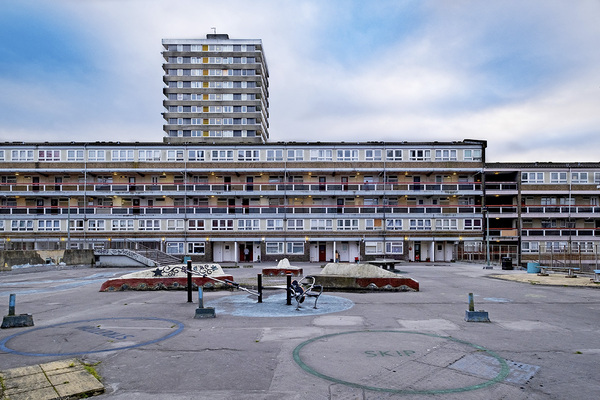You are viewing 1 of your 1 free articles
The Thinkhouse review of housing research: January
As part of a new monthly series, Richard Hyde reveals what the Thinkhouse editorial panel has been looking at this month
Thinkhouse is a new website set up to be a repository of housing research. Its editorial panel of economists, chief executives and academics critiques and collates the best of the most recent housing research (scroll down for more information).
One of the most cited consequences of the housing shortage is the rise in homelessness, and this month two major reports have been under the Thinkhouse spotlight:
1. National Audit Office – Homelessness
The Thinkhouse editorial panel has just published its review of September’s National Audit Office (NAO) report into homelessness.
This report by the NAO produced some stark data and concluded that the ending of private sector shorthold tenancies is the main cause of homelessness, which has risen from 11% to 32% in the past seven years.
Local authorities spent £1.15bn in 2015/16 on homelessness. There are 77,000 households in temporary accommodation, a 60% rise since 2011. Homelessness is more likely in areas with the least affordable housing; ie there are wide regional variations.
“This report produced some stark data and concluded that the ending of private sector shorthold tenancies is main cause of homelessness.”
Private rent accommodation costs have increased three times faster than earnings and in London this is eight times this.
Beth Watts, member of the Thinkhouse editorial panel and senior research fellow at Heriot-Watt University, said in her review of the report: “The NAO report chimes with consistent evidence from Crisis and the Joseph Rowntree Foundation’s Homelessness Monitors series regarding the impacts of welfare reform, and the household survey-based explorations of the drivers of homelessness that point to the absolutely central role of poverty.
“In relation to costs, the NAO highlights the manifold impacts of homelessness on those experiencing it and on wider public services… The controversy so soberly described in this report continues, as reflected in the recent Public Accounts Committee report, which pulls no punches in describing current levels of rough sleeping as ‘appalling’ and the extent of homelessness in England a ‘national crisis’.”
The government will point to the Homelessness Reduction Act, passed in April 2017 and to be implemented this year, as a key part of its policy response.
The act has the potential to transform the way homelessness services are delivered and ensure that all eligible applicants are given the help they need.
It requires local housing authorities to help all eligible applicants – rather than just those in ‘priority need’. It builds on the preventative approach in the 2002 act, by requiring public authorities (such as the NHS) to notify the housing authority if someone they’re working with is facing homelessness.
Of course, it will take time before there is evidence to assess whether the act is making a difference.
Our editorial panel looks forward to receiving and reviewing it.
2. Crisis – Ending Rough Sleeping: What Works?
A report published just days before Christmas, and being assessed in the January round of reports by our editorial panel, stated that more needs to be done to resolve homelessness and uses very detailed research to demonstrate those interventions that work.
Ending Rough Sleeping: What Works? by Crisis provides an international perspective on ending rough sleeping.
It reports that current approaches to address rough sleeping are not as effective as they might (and need to) be as they are not focused enough on prevention.
It highlights the need for solutions to be housing led, in particular offering swift access to permanent housing without pre-conditions – known as Housing First.
Housing First is person-centred support provided on a flexible basis for as long as it is needed.
The approach marks a significant departure from ‘treatment first’ and has had modest uptake to date in the UK.
It has been developed to a much greater extent in the US and was supported by a strong randomised controlled trial evidence base. The evidence demonstrates the success of Housing First compared to treatment first.
However, Housing First is not a low-cost option and no analysis was provided in this report to assess whether the short-term costs are recovered in the long term with savings in the health and criminal justice systems.
The report also looks in detail at the effectiveness of the hostels and shelters (H&S) model that is the UK’s predominant accommodation-based emergency/temporary response to street homelessness.
“No analysis was provided in this report to assess whether the short-term costs [of Housing First] are recovered in the long term.”
It struggles to find really compelling and clear evidence, and draws on expert perspectives to conclude: “First, H&S can be ‘dangerous places’ that ultimately cause harm to individuals who stay there. Several interviewees described how people were ‘choosing’ to sleep rough rather than access shelter provision.
“Second, there are concerns that the model is not suited to a significant range of groups, many of whom need more intensive support. Interviewees suggested that H&S are not suited to those with highly complex needs and who could sometimes pose a risk to staff and other clients.
“Equally, the intervention is often not suited to groups facing multiple forms of exclusion such as ethnic minorities, young people, people on the autism spectrum and those from the LGBTQ community. A number of gaps in provision were also highlighted for couples and those with pets. Third, H&S can be difficult to manage from a staffing perspective with high turnovers of staff as a result of the very challenging work environment.”
As a result, the report recommends that hostels and shelters need to be provided as part of longer-term solutions that could include: Housing First – person-centred support with personalised budgets (support workers have control over a budget for each rough sleeper); swift action such as No Second Night Out (assisting those new to rough sleeping); cross-sectoral support and assertive outreach to target those with complex needs and entrenched rough sleepers.
Our editorial panel is in the process of assessing this report further, as well as others that have recently been published.
All the reports will be held on the site but those that the panel consider supported by high-quality research and evidence and offer practical solutions will given a high profile and the panel will write a review to give site users an understanding of the reports key content and importance.
Richard Hyde, chair, Thinkhouse editorial panel
Update: at 12.01pm 30.1.18
This article has been amended. An earlier version incorrectly said the Crisis reported backed Common Ground - a scheme in which vulnerable rough sleepers are accommodated alongside those with a history of rough sleeping. The report did not actually endorse this approach.
What is Thinkhouse?
Thinkhouse was formally launched in spring 2018, and aims to “provide a single location and summary of the best and most innovative research pieces, policy publications and case studies”.
It specifically looks at reports that propose ways to boost the amount and quality of housing and the economic, social and community issues of not doing this.
The Thinkhouse editorial panel highlights the ‘must-read’ reports, blogs about them and runs the annual Early Career Researcher’s Prize.
The panel includes current and former housing association chief executives, academics, lawyers, economists and consultants. It is chaired by Richard Hyde, chief executive of a business that sells construction hand tools.
Who is on the panel?
Richard Hyde | Chair of Editorial Panel, CEO of HYDE |
Gemma Duggan | Head of Compliance and Performance at Extracare |
Chris Walker | Economist |
Brendan Sarsfield | CEO, Peabody |
Mick Laverty | CEO, Extracare Charitable Trust |
Martin Wheatley | Senior Fellow, Institute for Government, |
Kerri Farnsworth | Founder & MD, Kerri Farnsworth Associates |
Suzanne Benson | Head of Real Estate for the Manchester office of Trowers. |
Burcu Borysik | Policy Manager at Revolving Doors Agency, |
Ken Gibb | Professor in housing economics at the University of Glasgow, Director of CaCHE |
Peter Williams | Departmental Fellow, Department of Land Economy, University of Cambridge |
Brian Robson | Executive Director of Policy and Public Affairs at the Northern Housing Consortium |
Francesca Albanese | Head of Research and Evaluation at Crisis |
Jules Birch | Journalist and blogger |
Susan Emmett | Head of Engagement for Homes England |
Mark Farmer | Founder and CEO Cast Consultancy |
Steve Moseley | Group Director of Governance, Strategy & Communications at L&Q |
Jennifer Rolison | Head of marketing at Aquila Services Group |
Philip Brown | Professor of Housing and Communities at the University of Huddersfield |
Anya Martin | Senior researcher at the National Housing Federation |
Emily Pumford | Policy & strategy advisor, Riverside |
Anthony Breach | Analyst, Centre for Cities |
Shahina Begum | Customer Insight Office, Peabody |
What is Thinkhouse?
Thinkhouse was formally launched in spring 2018, and aims to “provide a single location and summary of the best and most innovative research pieces, policy publications and case studies”.
It specifically looks at reports that propose ways to boost the amount and quality of housing and the economic, social and community issues of not doing this.
The Thinkhouse editorial panel highlights the ‘must-read’ reports, blogs about them and runs the annual Early Career Researcher’s Prize.
The panel includes current and former housing association chief executives, academics, lawyers, economists and consultants. It is chaired by Richard Hyde, chief executive of a business that sells construction hand tools.
Who is on the panel?
Richard Hyde | Chair of Editorial Panel, CEO of HYDE |
Gemma Duggan | Head of Compliance and Performance at Extracare |
Chris Walker | Economist |
Brendan Sarsfield | CEO, Peabody |
Mick Laverty | CEO, Extracare Charitable Trust |
Martin Wheatley | Senior Fellow, Institute for Government, |
Kerri Farnsworth | Founder & MD, Kerri Farnsworth Associates |
Suzanne Benson | Head of Real Estate for the Manchester office of Trowers. |
Burcu Borysik | Policy Manager at Revolving Doors Agency, |
Ken Gibb | Professor in housing economics at the University of Glasgow, Director of CaCHE |
Peter Williams | Departmental Fellow, Department of Land Economy, University of Cambridge |
Brian Robson | Executive Director of Policy and Public Affairs at the Northern Housing Consortium |
Francesca Albanese | Head of Research and Evaluation at Crisis |
Jules Birch | Journalist and blogger |
Susan Emmett | Head of Engagement for Homes England |
Mark Farmer | Founder and CEO Cast Consultancy |
Steve Moseley | Group Director of Governance, Strategy & Communications at L&Q |
Jennifer Rolison | Head of marketing at Aquila Services Group |
Philip Brown | Professor of Housing and Communities at the University of Huddersfield |
Anya Martin | Senior researcher at the National Housing Federation |
Emily Pumford | Policy & strategy advisor, Riverside |
Anthony Breach | Analyst, Centre for Cities |
Shahina Begum | Customer Insight Office, Peabody |












